|
|
|
Sort Order |
|
|
|
Items / Page
|
|
|
|
|
|
|
| Srl | Item |
| 1 |
ID:
129841
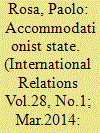

|
|
|
|
|
| Publication |
2014.
|
| Summary/Abstract |
This article aims to highlight the impact of strategic culture on Italian attitude to war and peace. The first section shows how both structural interpretations based on the influence of international variables and domestic models that neglect the cultural dimension offer no adequate explanations of Italy's military behaviour. The second section reviews the literature on strategic culture and its usefulness to explain the Italian case. The third section examines the characteristics of Italy's strategic culture through the period of the Republic, and the fourth examines the influence of ideational factors on its military behaviour abroad. In this section, a series of hypotheses derived from structural and cultural models are tested using data from the Correlates of War dataset. The conclusion provides a summary of the research findings that emerged from the empirical analysis.
|
|
|
|
|
|
|
|
|
|
|
|
|
|
|
|
| 2 |
ID:
134090
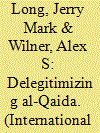

|
|
|
|
|
| Publication |
2014.
|
| Summary/Abstract |
Deterring terrorism is no longer a provocative idea, but missing from the contemporary theoretical investigation is a discussion of how delegitimization might be used to manipulate and shape militant behavior. Delegitimization suggests that states and substate actors can use the religious or ideological rationale that informs terrorist behavior to influence it. In the case of al-Qaida, the organization has carefully elaborated a robust metanarrative that has proved to be remarkably successful as a recruitment tool, in identity formation for adherents, as public apologia and hermeneutic, and as a weapon of war-the so-called media jihad. In the wake of the upheaval of the Arab Spring, al-Qaida and its adherents have redeployed the narrative, promising a new social order to replace the region's anciens régimes. Delegitimization would have the United States and its friends and allies use al-Qaida's own narrative against it by targeting and degrading the ideological motivation that guides support for and participation in terrorism.
|
|
|
|
|
|
|
|
|
|
|
|
|
|
|
|
| 3 |
ID:
145076
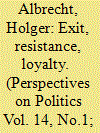

|
|
|
|
|
| Summary/Abstract |
A few years into the most recent wave of popular uprisings—the Arab Spring—studying regime trajectories in countries such as Syria, Egypt, and Yemen still seems like shooting at a moving target. Yet what has not escaped notice is the central role military actors have played during these uprisings. We describe how soldiers have three options when ordered to suppress mass unrest. They may exit the regime by remaining in the barracks or going into exile, resist by fighting for the challenger or initiating a coup d’état, or remain loyal and use force to defend the regime. We argue that existing accounts of civil-military relations are ill equipped to explain the diverse patterns in exit, resistance, and loyalty during unrest because they often ignore the effects of military hierarchy. Disaggregating the military and parsing the interests and constraints of different agents in that apparatus is crucial for explaining military cohesion during such crises. Drawing on extensive fieldwork we apply our principal-agent framework to explain varying degrees and types of military cohesion in three Arab Spring cases: Bahrain, Yemen, and Syria. Studying military hierarchy elucidates decision-making within authoritarian regimes amid mass mobilization and allows us to better explain regime re-stabilization, civil war onset, or swift regime change in the wake of domestic unrest.
|
|
|
|
|
|
|
|
|
|
|
|
|
|
|
|
| 4 |
ID:
107799
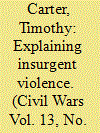

|
|
|
|
|
| Publication |
2011.
|
| Summary/Abstract |
The ongoing war in Afghanistan presents many questions for both scholars and policymakers. In particular, understanding insurgent military behavior generates considerable interest. Using a newly assembled daily, province-level data set, I begin to study the violence, focusing on the timing of US and allied fatalities in the war. I evaluate arguments commonly made about those elements favoring insurgent military success, proximity to resupply and difficult terrain, and find strong evidence supporting the first but less supporting the second as determinants of coalition fatalities. In addition, I find significant evidence linking factors unexamined in most civil war research, such as religious observance (the month of Ramadan) and warm weather, to these fatal events.
|
|
|
|
|
|
|
|
|
|
|
|
|
|
|
|
| 5 |
ID:
142076
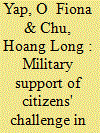

|
|
|
|
|
| Summary/Abstract |
When do militaries in the newly industrialized countries of East and Southeast Asia support their governments, when do they support citizens' challenge of government, and when do they launch coups? We propose and test a theory of military behavior using data from across East and Southeast Asia between the 1970s and 2008. The results corroborate the model's predictions to make four contributions: First, the model provides a framework of military behavior for countries to expand study beyond coups or the absence thereof. Second, the findings bring to focus the influence of citizens on the military's behavior, an aspect largely overlooked in scholarship of the region. Third, the necessary conditions—weak economy and galvanized citizens' challenge— that affect the military's behavior vis-à-vis citizens and the government highlight the strategic interaction treatment. Fourth, this study broadens systematic treatment to enrich empirics and theory-building for the political economies of these countries.
|
|
|
|
|
|
|
|
|
|
|
|
|
|
|
|
|
|
|
|
|